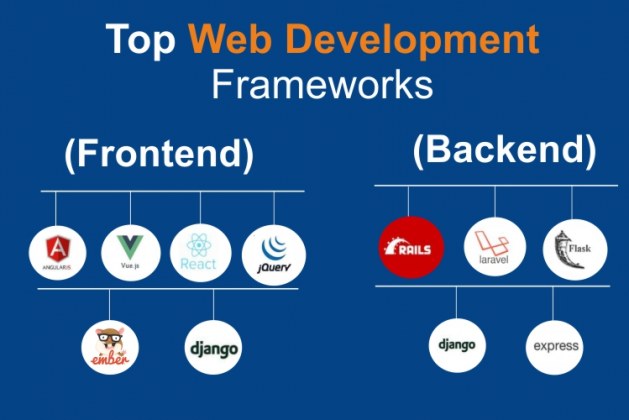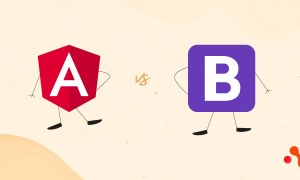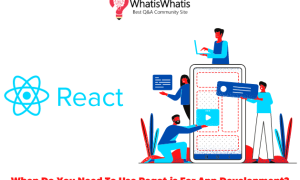In today’s digital world, having a website for your business is a necessity. As a result, your company will be able to reach a larger audience and generate more business leads. Because of the increased need for web application development, there are now a number of useful frameworks available.
These frameworks were created with the needs of today’s businesses in mind, and they make it easy to create high-quality web applications.
These ten frameworks for front-end and back-end development are widely used and are considered to produce the best outcomes. In addition, we’ll help you find front-end and back-end developers for your project, so you don’t have to.
How has the app development process been facilitated by web development frameworks?
Building web apps is now much simpler thanks to the proliferation of frameworks built on a variety of different programming languages. Consequently, the need for backend and front-end developers is on the rise.
Reasons why web frameworks have made it easier to develop new online applications:
Enhanced Performance
Web frameworks are specifically created with pre-built features and capabilities in order to give incredibly high efficiency and performance when building apps.
The loading capacity of websites built with the right framework is greatly increased.
Reduced Errors
The best software engineering approaches are often found in framework methodologies. Pre-built or externally integrated testing mechanisms can be found in many web frameworks, limiting the number of faults that can be found in the final product.
Increased Productivity
Pre-written templates and objects are common in most web frameworks, making it easy to automate repetitive programming chores. Developers benefit from the time savings and increased productivity that these technologies provide by being able to concentrate on what they do best: writing code.
Better Reliability and Security
Hundreds of ready-to-use components have been produced and continually updated by a community of developers in order to provide better reliability and security.
Your project won’t get lost in the shuffle thanks to the widespread support of the programming community, which means the optimal solution to the business problems can be developed.
Read Also: Choosing the Right JavaScript Framework for Your Cross-Platform Web Application
What Kinds of Frameworks are there for Web Development?
An application’s client-side and server-side components are both included in every web application. Web frameworks can be divided into front- and back-end frameworks.
1. Framework for front-end web development
Front-end development frameworks are used to create web applications’ user interfaces. Programming languages such as JavaScript, HTML, and CSS are commonly used in front-end frameworks.
The front-end framework is in charge of the UX/UI design and other critical components of the program, such as SEO optimization, code snippets, templates, and user interaction management, among other things.
2. Web development framework for the backend
A web app’s backend, or “hidden component,” is designed with the help of frameworks like those described above. Programming languages including Python,.NET, Ruby, Java, and PHP are used to build backend frameworks.
Server and database functions, routing protocols, solution logic, and more are all handled by them. They also handle data security, permission options, and more.
Listed below are the top web development frameworks that can be used to create mobile applications by 2022:
Best 10 Web Development Frameworks List in 2022
1. Angular (Frontend)
More and more firms are using Angular as a front-end framework to build their websites and other web-based applications. JavaScript was the programming language of choice for Angular when it was initially introduced in 2009. In 2016, it was rewritten to use Typescript rather than JavaScript. Angular is well-known for creating dynamic web pages on the client side.
There are a lot of components in Angular, including controllers, libraries, and directives, making it more difficult to master than other frameworks. With Angular, you can construct fast, single-page apps because of its MVC (Model-View-Controller) foundation.
Read Also: Top Reasons Why .Net Core with Angular is a Great Mix for Web App Development
2. Vue.Js (Frontend)
Single-page apps and user interfaces for web apps can be built using the Vue web framework. MVVM architecture is used in the framework (Model-View-ViewModel). It’s easy to use and includes a wide range of tools and capabilities for creating useful user interfaces. In terms of ease of use and integration, Vue is an excellent choice.
3. React (Frontend) – Web Development Frameworks
A JS library developed by Facebook, React is called React.js (now Meta). React is a front-end framework for building single-page applications. Additionally, it facilitates the creation of mobile applications, something that the majority of other frameworks do not allow for.
Routing, state management, and API connection are all made possible by React’s seamless integration with a wide range of other libraries.
4. The jQuery plug-in (Frontend)
jQuery is a JavaScript library that is used to construct app user interfaces. The simplicity and cross-browser compatibility of jQuery make it a popular choice. With the help of this framework, DOM elements and syntactic structures may be easily intertwined.
Developed apps benefit greatly from the framework’s ability to produce stunning visual effects and animations. jQuery is a lightweight framework with a wide range of plugins that may be readily integrated into its design.
Read Also: Top 15 Mobile App Development frameworks in 2022
5. Ember (Frontend)
Ember has repeatedly established itself as the top Javascript framework. There are a number of built-in features in Ember that may be leveraged to create highly useful apps. Tech titans like Google, Microsoft, and Netflix use Ember.
When it comes to the MVMM architecture, Ember falls right in the middle of the pack. Web apps can be developed without the requirement for redundant chores thanks to the use of some of the best JS practices.
6. Django (Backend+Frontend)
Django is a well-known Python framework that is in high demand by developers and businesses alike. Django makes advantage of the MVT (Model-View-Template) Architecture and the concept of code reusability to construct applications more quickly.
You may use Django to build both the front- and back-end of your application using this web framework.
Backend operations at companies like Instagram, Disqus, and NASA are all powered by Django. Django’s messaging, validation, and authentication are some of its most important features. Using this framework, massive and sophisticated commercial projects can be designed.
7. Ruby on Rails (Backend)
In terms of web development frameworks, it’s one of the most well-known and widely used. Over 800,000 websites have been built using the Ruby programming language. Supports the use of advanced algorithms to construct functional logic for difficult business issues.
Cloud-based apps can be built using their rich libraries and tools. This framework is used to create apps like Airbnb, Hulu, GitHub, and Groupon.
8. The Laravel framework (Backend)
Using the PHP scripting language as its foundation, Laravel is a PHP-based framework. Model-View-Controller (MVC) is the architecture of choice for Laravel. It is one of the top web development frameworks in 2022.
The framework is versatile and expandable because of the API support and several packages it includes. For web applications, the framework is most commonly employed in the development of the backend. Laravel backend developers can be hired for small to mid-sized web projects.
9. Flask (Backend)
Using Flask, you can create powerful, lightweight, and high-performance online apps that are easy to maintain. As a microframework, it has everything you need to build an application from the ground up.
RESTful request dispatch, unit testing, WSGI compliance, and Unicode compatibility are just some of Flask’s highlights. To get the greatest results for your project idea, you can engage a Python programmer who is also familiar with Flask.
10. Express.JS (Backend)
Express is a Node.js API that can be used to build incredibly sophisticated and functional web apps. Due to its greater adaptability, it is primarily employed by major corporations.
It is well-suited for creating functioning apps because of its many built-in features and functionality, like third-party connectors, routing, templating, and server-side scripting. If you’re familiar with the nuances of the language, you’ll appreciate how simple it is to use.
Also Read: Top Node.js Trends that Every Developer should Explore
Conclusion
A web framework is an essential part of the creation of software. The strengths and weaknesses of every one of them are distinct. If you have a specific project in mind, you can use any of them to get the greatest results.
Author Bio:
A passionate Digital Marketer from 2016. Love to explore new things. In his free time, he loves to write about technologies, startups, and digital marketing. Currently, he is associated with TechJain IT Solution: an IT Service Company in Bhopal.






Leave a comment